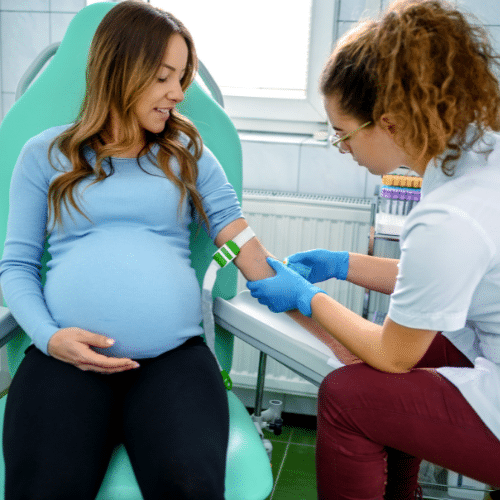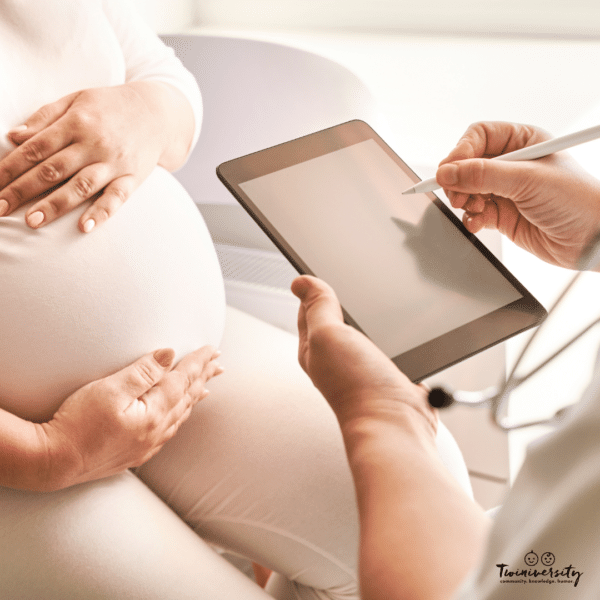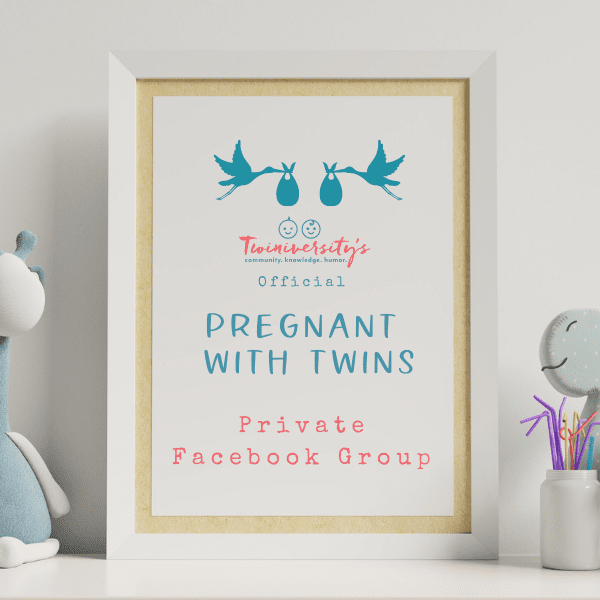Last updated on March 6th, 2024 at 08:33 pm
From the moment you find out you’re having twins, their health is likely your number one concern. While most babies are born healthy, your doctor may suggest prenatal genetic testing and screening for health conditions. Read on to learn more about these tests and how they can provide valuable insight into your twin pregnancy.
Disclaimer: All content on this Web site, including medical opinion and any other health-related information, is for informational purposes only. It should not be considered to be a specific diagnosis or treatment plan for any individual situation. Use of this site and the information contained herein does not create a doctor-patient relationship. Always seek the direct advice of your own doctor in connection with any questions or issues you may have regarding your own health or the health of others.
What Is Prenatal Genetic Testing?
Prenatal genetic testing gives parents-to-be a more complete picture of the health and development of their babies. Using screening and diagnostic techniques, these tests aim to offer more information about potential and existing genetic disorders.
Risk factors such as maternal age, health, family history, and ethnicity can influence your baby’s chance of chromosomal abnormalities. Knowledge of your risk for these conditions and what to expect can help families prepare for their babies arrival.
Some conditions that prenatal genetic testing screen for and diagnose include:
- Down syndrome
- Cystic fibrosis
- Spinal muscular atrophy
- Thalassemia
- Fragile X syndrome
- Tay-Sachs disease
- Familial dysautonomia
- Spina bifida
Twin pregnancy carries higher risks and and can have more complications than singleton pregnancy. Therefore, you want to discuss with your doctor whether prenatal genetic testing is right for you.

Pregnant with twins and not sure where to start? Visit the Ultimate Twin Pregnancy Guide to find all the top articles and resources to get you ready for twins. While you’re at it, check out our expecting twin classes and Twiniversity shop!
What Are the Types of Prenatal Genetic Testing?
The thought that your unborn child might have a genetic disorder can cause anxiety for expectant parents. Thankfully, there are a few different types of prenatal genetic screenings and tests available for each stage of pregnancy. Coupled with routine monitoring of blood pressure and urine, prenatal genetic testing offers more information about the health of your babies.
Prenatal Screening Tests
Prenatal genetic screening tests offer insight into the likelihood that your baby has chromosomal abnormalities. Your obstetrician or fetal monitoring specialist will evaluate the results of genetic screening to determine if diagnostic testing is necessary.
Ultrasound
An important part of a healthy pregnancy, ultrasounds use sound waves to see your babies in the womb. Ultrasounds can also be used to diagnose birth defects and structural abnormalities. While each twin pregnancy is different most will have at least two screening ultrasounds:
- Between 10-14 weeks the NT scan measures nuchal translucency for possible chromosome abnormalities
- Between 18-20 weeks the anatomy scan gives more detailed information about physical development. This scan can also provide sex information (if your twins cooperate!)
Carrier Screening
A test for parents using a sample of blood, saliva, or cheek tissue, carrier screening evaluates the risk of inherited genetic conditions. Carrier screening can take place at any time, before or during pregnancy. You might consider carrier screening prior to pregnancy if you have a family history of a genetic condition.

Nuchal Translucency Screening (NTS)
The nuchal translucency screening takes place via ultrasound between weeks 10-14 of pregnancy. This scan measures the thickness of the nuchal fold, an area of fluid-filled tissue at the back of baby’s neck. These measurements determine if further testing is necessary to diagnose conditions such as Down syndrome and neural tube defects.
Non-Invasive Prenatal Testing (NIPT)
During pregnancy, parts of baby’s DNA circulate in the mother’s bloodstream. Testing the mother’s blood for this cell-free DNA (cfDNA) can determine if the babies might carry genetic conditions. NIPTs, such as Harmony and Panorama, are offered as early as ten weeks gestation. These tests are less invasive than other genetic testing, requiring only a maternal blood test.
Non-invasive prenatal testing may not be as accurate for dizygotic twin pregnancy due to imbalances in the contribution of cell-free DNA. As a result, it can be difficult to determine which twin has the health issue without further testing. This is not the case with monozygotic (identical) twin pregnancies as the babies share the same genetic make-up.
Studies have also shown an increased risk of false positives in comparison to singleton pregnancies. Despite this, NIPT is recommended as a screening tool for multiples pregnancy to determine zygosity and screen for trisomy disorders. However, NIPT cannot be completed with triplets or higher-order multiples.

Prenatal Diagnostic Tests
Prenatal diagnostic tests diagnose genetic disorders through the sampling of cells from the womb and placenta. There are two types of diagnostic tests: amniocentesis and chorionic villus sampling.
Amniocentesis
Amniotic fluid surrounds babies in the womb, protecting them from injury and infection. This fluid also contains enzymes, proteins, hormones, and cells shed by the baby during development. When a screening test shows increased chances of health concerns your doctor may recommend an amniocentesis to confirm diagnosis.
Although it is more invasive than screening tests due to the insertion of a needle into the abdomen, amniocentesis is safe and reliable. In most cases, it gives accurate diagnostic information about certain genetic disorders. Amniocentesis usually takes place between weeks 15 and 20 of pregnancy with results in 10-14 days.
Chorionic Villus Sampling (CVS)
The chorionic villi are tiny projections of placental tissue containing genetic information about the baby. A small needle inserted into the abdomen or vagina harvests a sample of the chorionic villi to be tested. CVS can take place as early as 10 weeks gestation with results in less than 2 weeks. Although slightly riskier than amniocentesis, CVS is performed earlier giving parents more time to learn and prepare.
What Are the Risks of Prenatal Genetic Testing for Twins?
There are a few risks with prenatal diagnostic tests, specifically amniocentesis and chorionic villus sampling. The most common complications include cramping, pain, bleeding, increased risk for preterm labor, and less than 1% risk of miscarriage. These risks increase slightly with twins, specifically in a diamniotic pregnancy, as samples are taken from both babies.
While the risks are small, complications can occur so it’s important to know ahead of time what to expect.
Prenatal genetic screening and testing can lead to increased anxiety and fear over an unexpected diagnosis. It’s hard to learn your child has health issues at any time, but it can be better to know sooner than later.
Although rare, false-positive results can occur. This can lead to unnecessary worry for parents. None of these tests claim 100% accuracy and this risk highlights the importance of consistent monitoring and a good relationship with your doctor.

Should I Have Prenatal Genetic Testing on My Twins?
The decision to have prenatal genetic testing is very personal. If you are considering prenatal genetic testing on your twins, consult your fetal monitoring specialist or a genetic counselor. They will assess your risk and help determine your path for prenatal genetic screening and testing.
When deciding whether to pursue prenatal genetic testing consider what you will do with the information you receive. Certain genetic conditions carry a higher risk of fetal demise. In this case, a diagnosis can also lead to difficult decisions about your pregnancy.

For many, a diagnosis won’t change the outcome. Instead, it will help them to make informed decisions and prepare for the needs of their babies.
Another consideration is the anxiety and fear that a prenatal genetic test can cause. For many, it is not worth the stress and they choose to forgo all testing and hope for the best.
Every family is different and in the end, only you can decide if prenatal testing is right for you.

Did you know we have a FREE Facebook group just for expecting twin parents? Hurry and join today to find support from expecting twin mamas who get it!
The Bottom Line
Twin pregnancy is an exciting and sometimes scary time. With so many decisions and preparations to make, the stress of possible health conditions can be overwhelming. Prenatal genetic screening and testing can help ease your concerns and give valuable information about the health of your babies. Take the time to consider all your options before making the best choice for your family.










